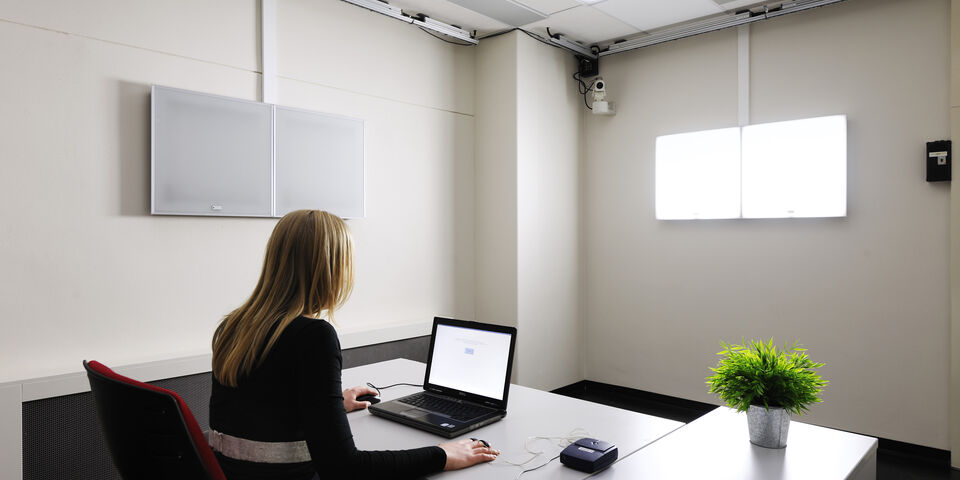Bright light during the day boosts energy and increases alertness
What effect does light have on a winter depression? How to avoid a jetlag? We already know a lot about the role of light in such circumstances. But what can light do for our energy levels and wakefulness during office hours? We’re not so sure. Doctoral candidate Karin Smolders researched just that and found out people benefit from bright light during the day just as well. She’ll be defending her dissertation on the subject on 3 December, after which she’ll receive the first-ever doctorate from the Intelligent Lighting Institute that was founded in 2010.
Everyone has felt low on energy at work at some point. Coffee can help, or a brisk walk outside. But lighting can also make you feel more vital and alert in the workplace, research from Karin Smolders shows. “There have been many studies at night”, she says. “But we were interested in the effects of light during the day, studying healthy people.” The researcher at Human Technology Interaction focused on the effects of artificial white light on alertness and vitality. She explains: “We’ve monitored how people carried out certain tasks, and how alert and energetic they feel under specific lighting conditions.”
Smolders researched the influence of light in several ways. She started by conducting a field study for which she attached a light meter either to glasses or a special headband. Over the course of a year, 52 test subjects were asked to wear the instrument for three days, so it could measure the amount of light that hits the eyes. Via an application on their phones, subjects were asked about how they felt every hour. The answers proved that the more light they had been exposed to the more energetic they felt right after.
Smolders also conducted lab tests. There, lighting conditions were predetermined rather than arbitrary like in the field study. Using a light panel, subjects were either exposed to bright light (1000 lux) or dimmer light (200 lux). In both cases, the light was beamed directly into the eye (photo). Participants were asked to carry out several tasks and answer surveys while exposed to the light. Their physiological activity was monitored as well. During the tasks, they had to respond whenever they heard a beep, or organize letters and numbers, for example.
Smolders also studied if the effects of lighting were more drastic when people are mentally exhausted. To that end, subjects had to carry out demanding tasks such as handling a flight simulator where they had to check the fuel, fly the aircraft, and monitor all communication, all prior to being exposed to bright or dim light. Thus, exhaustion was introduced by performing tasks that required a lot of concentration – and not by forced sleep deprivation. “It was important they slept like they always did, had a normal rhythm”, Smolders explains. “We were interested to know how healthy people could benefit from lighting in their daily lives especially.” Finally, the researcher studied the lighting needs of people who feel tired, in the lab. For those studies, subjects were asked to set their own lighting preferences.
Results showed that people feel more alert and energized after having been exposed to bright light. Both the field study – in ‘natural’ circumstances – and lab tests – with predetermined conditions – proved that. Lab studies also showed that being exposed to brighter lighting may lead to quicker responses during tasks that require a high concentration, and a higher level of physiological activity. Still, test subjects neither preferred brighter lighting, nor did they always score better on every task necessarily, even though they indicated feeling more alert and vital. Lab results also brought to light that participants felt more alert and revitalized almost immediately after being exposed to bright lighting, but their performances (carrying out attention tasks) only improved approximately half an hour after first exposure.
Smolders: “We can’t translate the results from night-time studies to the influence of lighting during the day just like that. Bright light seems to improve people’s performance for specific tasks only. The time of day, time of year even, also seems to play a part. Results indicate that people benefit from bright light in the morning rather than in the afternoon. And fall and winter are the best seasons to be exposed to brighter light. We have to continue research, of course, but so far our results prove that people feel more alert and revitalized, and possible even perform better when exposed to relatively bright lighting. Whether or not bright light really contributes to people’s alertness and performance seems to be dependent on the nature of the task, the subject’s mental state, and the time of day. The best thing would be to adjust lighting for every user individually, bearing in mind their activity and time of day as well.”
According to Floor van der Heijden, health-and-safety expert and environmental scientist, it’s hard to say what light is used at TU/e. “It varies widely, and depends on the level of daylight in a room as well. Newer offices at Mechanical Engineering have a daylight-dependent lighting system, for example.” She says it’s ‘especially important to adjust lighting to what needs to be done: the lights in an office will therefore differ from the lighting in a lab’.
The Intelligent Lighting Institute has organized an event around Smolders defense:http://tinyurl.com/of3f7rp


Discussion